Lenin and Stalin
Documentaries
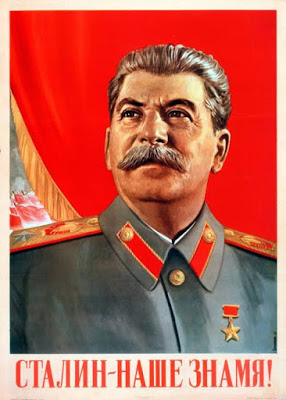
Director:
Various
Year: Various
Rating: Various
Three Songs About Lenin (1934) – 5/10
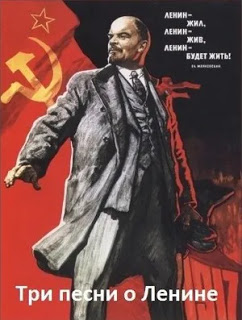
This is sort of like looking through a pinhole into the past. Fascinating
on one level but boring on another. This documentary/propaganda film was
directed by Dziga Vertov, the Russian filmmaker who made Man with a Movie
Camera in 1929; the film is listed by critics as one of the greatest and
most influential films ever made. Some day I should watch it. Vertov was
the founder of the Kino-Pravda school of filmmaking in Russia which translates
to Film Truth and later was translated to Cinema Verite. Vertov didn't believe
in narrative film - he thought it was a waste of time even criticizing the
works of Eisenstein. He wanted to capture real life as it happened. But he
used very inventive fast editing and imagery to propel his films.
Three Songs About Lenin was made for the 10th year anniversary of Lenin's
death and is broken into three pieces or movements with a song for each.
The first is a celebration of the unveiling of Muslim women in one of the
Islamic areas of the country. The second is about Lenin leading the country
to revolution and his death and laying in state funeral. The third is about
the progress the Soviet Union had made since Lenin's death claiming "If only
Lenin could see us now!". Apparently, a few years later the film had to be
revised to add on the contributions of Stalin. You didn't say no to Stalin.
This version that I saw did not have that. It runs a little less than an
hour.
Joseph Stalin:
Red Terror (2004) – 5/10
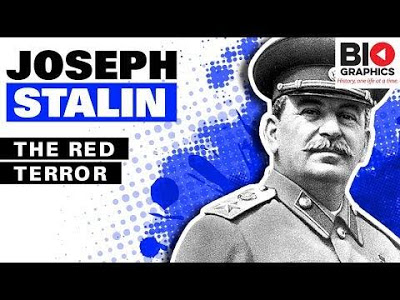
Since I watched the wonderful film The Death of Stalin I have looked into
Stalin's life a bit. He was a fascinating man as was his rise to power. He
was also an incredibly paranoid psychopath who killed millions of his own
people. It is amazing that we had both him and Hitler living at the same
time - probably the two greatest mass killers of all time. Stalin was both
feared and loved by his people which shows a peculiar Russian need for strong
men - from Czars to Stalin to Putin - that must stem from some sense of inferiority
- they always need someone making their decisions for them.
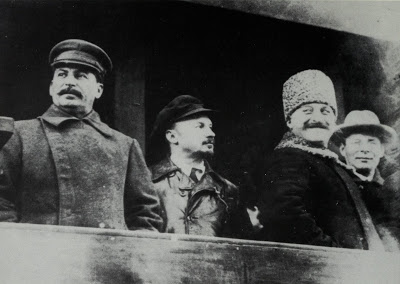
Stalin (which means Man of Steel) was born into extreme poverty in Georgia,
went to Seminary school where he dropped out to join the Revolutionary cause.
In the years leading up to the 1917 Revolution and the Civil War that followed
in the aftermath, Stalin did not have a large role - that was Lenin and Trotsky
and others. He was not an orator or a writer or a military man or a Communist
theorist - but what he understood was power. He burrowed his way into the
Party apparatus and with the failing health of Lenin he outmaneuvered all
those around him. He exiled Trotsky abroad in 1929 and began the collectivism
and industrialization of Russia. The collectivism led to famine and the deaths
of millions.
In the 1930's when he had total power he began the purges that either executed
or sent to the Gulags millions of people - he purged the Communist Party,
the military, the intellectuals, people late to work, people who said anything
negative - he set up a secret police apparatus that encouraged people to
turn in others - children their parents, neighbors, work colleagues - and
yet the people continued to love Stalin because they could see that he was
taking Russia out of the dark ages and partly because not many people really
understood what was going on.
Then war came and he showed immense courage by staying in Moscow when the
Nazis were at the door, Russian prisoners who were released were sent to
the Gulags or shot - but the Soviet Union was the primary reason Hitler lost
- by sacrificing 25 million people in the war. He took over most of Eastern
Europe - got atomic weapons - and then in 1953 he died. The nation mourned.
It wasn't until Khrushchev spoke at the 20th Party Congress in 1956 and told
of Stalin's atrocities (of which Khrushchev had been involved) that the world
began to learn of what he had done.
This documentary covers all of this in 45 minutes. So not a deep dive.
Tsar to Lenin (1937) – 7/10
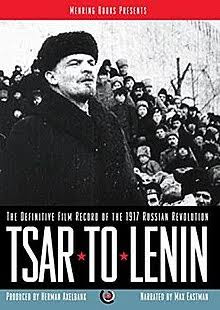
This is rather a fascinating archival look at the Russian Revolution. It
was produced in 1937 by The Socialist Equality Party in he USA and is narrated
by Max Eastman. Eastman was a leading voice in American leftist politics
during the 1920's and 1930's until he turned away from Socialism in the 1940's.
The Socialist Equality Party appears to be a worldwide Socialist Party associated
with Trotskyism. The film is simply a collected series of video footage edited
together to tell the story and there are some wonderful shots of historical
figures such as the Czar and his family and the Revolutionaries - Lenin,
Trotsky and many more. Near the end Stalin. Some horrific clips as well such
as The White Russians executing a number of Bolshevik prisoners three at
a time and it is almost comedic as their bodies fall into a pit and their
hats fly high - but it is real.
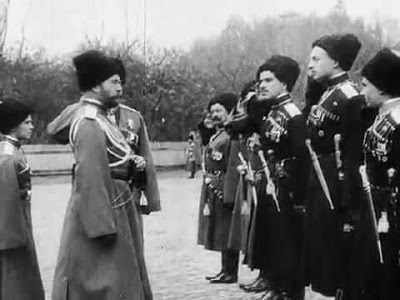
The film is clearly on the side of the Communists and ends with their victory
in the Civil War in 1920 and the gathering of the Communist International
(Comintern) that includes John Reed. It is such a hopeful moment with Lenin
in good humor and a country at peace. Who knows where Lenin would have taken
the Soviet Union - though he was certainly an advocate of the violent overthrowing
of governments - but he didn't seem to be a mass killer. The film sings his
praises as well as for Trotsky who led the army against the White Army. But
we will never know - within a year Lenin's health began to decline and he
slowly withdrew from the government and power until he passed away in January
1924. Stalin and the purges lay ahead.
I just finished reading a book titled Conversations with Stalin written by
Milovan Djilas who was a high member in the Yugoslavian Communist Party (he
was to condemn Communism later on and be jailed for his trouble) during WW
II and who met up with Stalin and other Russians a few times. As a side note,
he often mentions that the Russians he met up with were murdered by Stalin
within a few years. I would imagine that many of the Revolutionary leaders
we see in the film - including Trotsky of course - were eventually executed
in the Purges.
Stalingrad (2003)
– 7.0
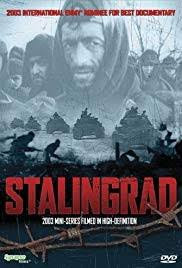
Three part documentary that is pretty thorough and detailed about the Battle
of Stalingrad. It is presented primarily from the German side with remembrances
from some of the few German survivors still alive and from letters from the
dead who didn't make it out of Stalingrad. What is strange about this is
that by the end you find yourself feeling great pity for the Germans who
go through hell and more - but then you remember these were Nazi's invading
another country who slaughtered thousands of civilians. The ones who made
it back though after surviving the battle and then being prisoners of war
first in Siberia and then helping to rebuild Stalingrad before being repatriated
to Germany in 1955 were some tough mothers with an incredible will to live.
Makes you wonder for a bit if you would have that in you.







